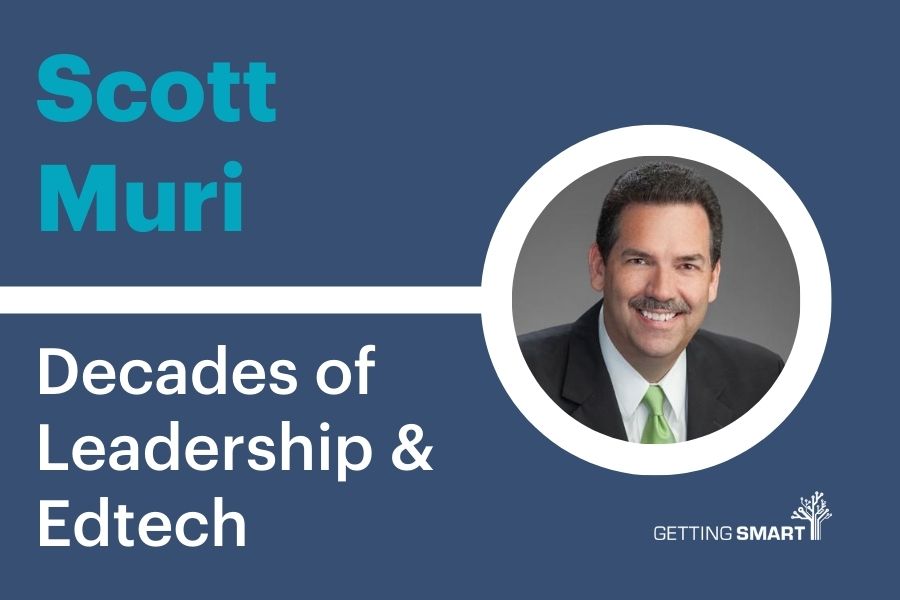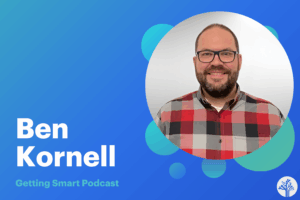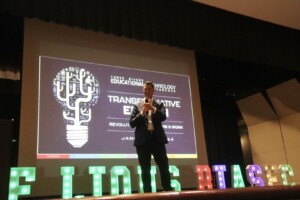Scott Muri on Decades of Education Leadership Service and EdTech
Key Points
-
Data and EdFi standards are keys to the success of Ector County School District.
-
Alternative compensation systems dramatically help with teacher retention, as well as pipelines to teacher training.

We’ve recently released a new publication that synthesizes years of research on AI and its impact on teaching and learning. You can find it at GettingSmart.com/artificial-intelligence/
On this episode of the Getting Smart Podcast Tom Vander Ark is joined by Dr Scott Muri, Superintendent of Ector County School District in Odessa, Texas.
Previously, he has served in numerous district leadership roles and is a leader in funding schools, educator prep and much more.
This is more than just a job, it is absolutely a calling.
Scott Muri
Transcript
Tom Vander Ark: Scott, on a good day in Odessa, how does Ed Tech play a role in learning?
Scott Muri: Ah, the first thing I think about, Tom, is blended learning. We’ve really tried to personalize as much as we can in some schools, and blended learning is a big deal here, with many of our teachers and principals thinking about how to meet individual student needs. Of course, tech plays a huge role in the blended learning environment. So, on a good day, it’s a blended day.
Tom Vander Ark: You’re listening to Getting Smart podcast, and I’m Tom Vander Ark. Today, I have the pleasure of being joined by Dr. Scott Muri. He’s the superintendent of Ector County ISD, which is in Odessa, Texas. Scott, Odessa is about halfway between Dallas and El Paso, or really Dallas and Juárez, right? You’re at the heart of the Permian Basin.
Scott Muri: That’s exactly right—right in the middle, the Permian Basin, the world’s leader in gas and oil production. We sit right on top of that.
Tom Vander Ark: Do you have the price of West Texas Intermediate on your district dashboard? Is that a key economic indicator?
Scott Muri: Of course! That’s exactly right. Definitely, gas and oil, and Friday night lights, Tom. You can’t forget that—we’re well-known for Friday night lights.
Tom Vander Ark: The history of Odessa, and specifically Ector County, was the inspiration for that great movie and TV series. Scott, you’re really a hero of ours at Getting Smart. You’ve had a great education leadership career as a teacher and a principal, but a couple of times along the way, you stepped into Ed Tech leadership roles. I wanted to explore those with you. You mentioned blended learning a few minutes ago. You started teaching in North Carolina back in the ’90s, at the beginning of the blended learning game, right?
Scott Muri: Yes, that’s right. I started my teaching career in 1988 in the mountains of western North Carolina as a middle and high school math and science teacher. Technology really played a role in those early years. You know, that’s when the internet was coming of age. It started out as a green screen phenomenon, and then multimedia was added. I remember bringing multimedia computers into the classroom with kids in the early ’90s, creating project opportunities for students using multimedia. Those were my early days as a teacher, many years ago.
Tom Vander Ark: Right at the beginning of blended learning. You made the shift to Florida as an instructional technology specialist. What was it about that position that caught your eye in Ed Tech and created that interest?
Scott Muri: It started when I was a teacher. Kids at every level need a hook, and just the fact that they have to go to school doesn’t incentivize them enough. I discovered that technology was a powerful hook in the hands and minds of kids. Then, in 1995, the Walt Disney Company was building a town called Celebration in Central Florida, with a K-12 public school intended to be state-of-the-art from a technology perspective. I wanted to be a part of that. I applied to be a teacher, but they offered me a different position—to lead the technology vision for the school. I said absolutely, and I spent 11 years in Central Florida, working at Disney’s Celebration School, helping create and implement a technology vision.
Tom Vander Ark: Was that an early one-to-one school?
Scott Muri: It was. And you may remember when the Apple eMate was introduced—Steve Wozniak came to Celebration and brought it with him. We gave every student an Apple eMate in the mid-to-late ’90s. That was the first one-to-one device we had for students, and we later switched to a clamshell device. It was truly one-to-one in the late ’90s.
Tom Vander Ark: After about 10 years there in Florida?
Scott Muri: Eleven years in Florida, then I left to go to Charlotte-Mecklenburg Schools.
Tom Vander Ark: Right, back to North Carolina. By the mid-2000s, Charlotte-Mecklenburg was nationally recognized for innovation. Just north of Charlotte-Mecklenburg was a famous little district on the map for blended learning, run by Mark Edwards.
Scott Muri: Yes, I remember Mark Edwards and his district just up the road. They were able to run in a positive direction, and we, as a large district, learned a lot from his early work in technology integration and its powerful effects.
Tom Vander Ark: I remember visiting there and going to Mark’s big summer blended learning conference. He invited all his teachers and administrators to learn alongside us.
Scott Muri: Yes, I remember that too. I joined Charlotte in 2007 as an area superintendent, then became the chief information officer. One of the CIOs in the state I learned a lot from was the CIO in Mark’s school system. We gleaned a lot from their expertise and tried to replicate that in Charlotte.
Tom Vander Ark: The CIO role was relatively new in big districts, though it had been around in business for years. Were you among the first of the big districts to have a CIO? What were your priorities there?
Scott Muri: Yes, we were among the first. It was about combining business and instructional technology, creating a unified system. We focused on devices for kids, building a learning management system, and buying digital content in the early 2000s. It was a lot of foundational work to support what teachers and kids needed in the classroom.
Tom Vander Ark: You spent a few years as a deputy in Fulton County in Atlanta, then became superintendent in Spring Branch ISD, a high-functioning, innovative suburb of Houston. Was it one-to-one when you got there?
Scott Muri: No, it was not. Spring Branch was a good-to-great scenario, a high-quality district with great leaders, teachers, and community support. Our focus on personalization led us to redesign the way we did school, focusing on data systems to provide teachers and students with information and creating a more individualized approach to schooling.
Tom Vander Ark: Spring Branch is known for its options for learners. Do you think technology’s ability to personalize and support pathways inherently encourages more options?
Scott Muri: Absolutely. Technology empowers teachers to create unique learning opportunities for kids. Adaptive software and tech that allow kids to learn outside the classroom open doors that didn’t exist before. It’s a powerful tool when used correctly.
Tom Vander Ark: Four years ago, you moved to Odessa and Ector County ISD, which has a lot more challenges. Is that fair?
Scott Muri: Yes, Ector County ISD was in an academic crisis, with half its schools rated D or F. The community wanted better for its kids, and I saw a chance to create meaningful change. Today, we’re a B-rated district with a lot of progress, though it’s been hard work.
Tom Vander Ark: But you only had about seven or eight months before the pandemic hit. Were you able to do some foundational work to prepare?
Scott Muri: Yes, we put a strategic plan in place, including bringing in a learning management system and tech tools. This early work helped us survive and even thrive through the pandemic.
Tom Vander Ark: I thought of you a lot during the pandemic. Many assumed we were good to go with one-to-one and broadband, but it turned out that millions of households lacked adequate access. Was that true in Ector County?
Scott Muri: Yes, 39% of our families lacked broadband, either because they couldn’t afford it or lived in areas without access. We had to deliver paper packets to those families initially. We partnered with SpaceX’s Starlink to provide high-speed broadband, starting with 90 families and expanding to hundreds.
Tom Vander Ark: How does Ed Tech look in Odessa on a regular school day now? Are most classes on an LMS?
Scott Muri: Yes, we’ve made a lot of progress. Every student has a device, every family has internet access, and we have an active LMS. Most content is digital, with incredible data systems supporting teachers and students. We adopted the Ed-Fi standard, making our data interoperable, which empowers teachers and students with integrated data.
Tom Vander Ark: Do your high school students use online learning to expand course choice?
Scott Muri: We partner with the University of Texas and offer online courses co-taught by university professors, which provides new learning opportunities. We don’t currently offer fully virtual programs for elementary or middle school students, but we do have blended options.
Tom Vander Ark: You’ve prioritized talent and leadership development in Ector County. How does tech play a role in this?
Scott Muri: We’ve made human capital investments from the beginning, reducing our teacher vacancy rate from 18% to 1%. We also offer significant compensation for effective teachers, have multiple teacher pipelines, and provide virtual coaching for National Board certification candidates. Technology is embedded in all of our professional learning efforts.
Tom Vander Ark: What are the gaps in Ed Tech where you’d like to see improvement?
Scott Muri: Data interoperability is still a challenge; the industry has too many walls. We also need to focus more on creating digital citizens who understand how to behave appropriately in an online environment. Digital literacy is essential, but we haven’t done enough to prepare students and adults for the responsibilities of the digital world. We need to embed these skills into our educational systems, so our students grow into responsible digital citizens.
Tom Vander Ark: That’s such an important point. I think we’ve seen rapid advancements in technology, especially in how it captures attention, but we haven’t kept up with teaching digital responsibility. Speaking of advancements, I recently listened to a TED Talk by Sal Khan about Khanmigo, a new generative AI chatbot in Khan Academy. Sal seemed excited about its potential. Do you share his enthusiasm for the future of AI in education?
Scott Muri: I do. I think AI presents exciting opportunities, especially in areas where we’ve struggled to scale, like tutoring. After the pandemic, we had a large number of students needing one-on-one tutoring, but finding enough qualified people was a challenge. We implemented virtual tutoring and saw great results. This year, we have thousands of students accessing virtual tutoring, and AI could further enhance this, especially for middle and high school students who prefer a chat-based environment. AI can provide interactive and responsive support, which could transform education.
Tom Vander Ark: AI indeed feels transformative. But here’s a challenging question—a school board-type question: Do you feel we’ve achieved any return on investment from all the money spent on Ed Tech? How and where do you see the benefits?
Scott Muri: Yes, I believe we have. We have academic data showing that blended learning investments are paying off. Not every investment has been perfect, but implementation fidelity is critical. When done well, tech investments lead to higher performance and empower students to own their learning by providing them with tools and dashboards to understand their progress. When students have access to their own data, they grow more engaged and take charge of their learning.
Tom Vander Ark: That’s encouraging. Looking ahead, technology is transforming workforce requirements globally. How is that impacting your thinking about postsecondary pathways for Ector County learners?
Scott Muri: In Texas, 70% of jobs require some form of postsecondary credential, whether it’s a two-year degree or a technical certificate. Our goal is to ensure that 70% of our students gain that postsecondary experience. Many families here work in the oil and gas fields, which are evolving with technology, reducing manual labor. If our students aren’t prepared for this shift, they’ll miss out on opportunities. So, we’re adapting our educational programs to align with these changing workforce requirements.
Tom Vander Ark: You’ve had a remarkable journey as an education leader. Would you recommend this career path to young people?
Scott Muri: Absolutely. I wake up every day loving what I do. I’ve just completed my 35th year in education, and every role I’ve held, from teacher to superintendent, has brought me joy. This is more than a job—it’s a calling. For anyone passionate about helping children and shaping the future, this profession is for you. I’m a strong advocate for education and its power to prepare the leaders of tomorrow.
Tom Vander Ark: We’ve been talking to Dr. Scott Muri, the superintendent of Ector County ISD. Scott, we appreciate your leadership and your willingness to learn out loud. You’ve been a tremendous advocate for public education, and your transparency and willingness to share your insights with others have made a big difference. Thank you for leading and for your dedication to equity and innovation.
Scott Muri: I appreciate it, Tom. Public education is a collective effort, and I’m grateful to be part of a community of colleagues across the country who are in this work together.
Tom Vander Ark: Thanks for being with us, Scott, and thank you to our producer, Mason Pasha, for making this podcast possible. Until next week, keep leading, keep learning, and keep innovating for equity.
Links:








0 Comments
Leave a Comment
Your email address will not be published. All fields are required.